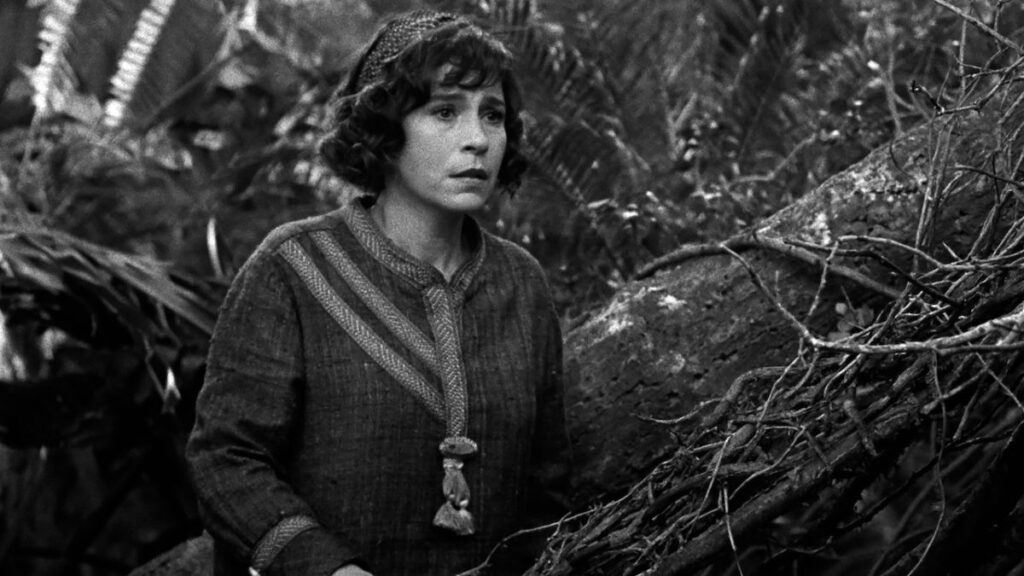For all the lush scenery and exotic vistas with which it meets the eye, Miguel Gomes’ Grand Tour is a movie defined as much by what we cannot or do not see than what we can and do. A chase movie in andante tempo, it’s forever in pursuit of destinations unknown. Stopping by locations only briefly, and running from distant histories of unclear provenance. It tells of stories that it never shows. Arrives in the aftermath of unseen events. And obscures and obstructs the veracity of even that which it does show with curious anachronisms and non-contemporaneous footage.
And yet this is also a distinctly simple movie, easy to follow in its general design. Edward ditches his fiancée, Molly, prior to her arrival on a pier in Burma, 1917. And subsequently flits from one Southeastern Asian port to the next. Sometimes fleeing any sign of personal responsibility, however minor, and perpetually fleeing the potential appearance of Molly.
Approximately half way through the movie, it’s the viewer’s turn to flee. And we now join Molly on her pursuit, tracing Edward’s steps city by city, country by country. She has no advance knowledge of his whereabouts, principally because neither does he until each new hasty departure. Neither has any advance knowledge of where they will end up by movie’s end.
Grand Tour is a movie that dwells on the past and gazes tentatively into the future. Yet remains fixed in the present. Late on, a character speaks of the serenity he experiences in abandoning his responsibilities. He is capable now, after a long career in service to the Christian church, of appreciating that which he has, however meagre, not straining to appreciate that which he has had, nor that which he may one day have.
Grand Tour’s qualities are far from meagre. Gomes’ stylistic sense here reaches new peaks, every frame a visual beauty, every note on the soundtrack an aural delight. Though the point of appreciating one’s present and surrendering all else is of greater import. Edward fixates on a past he therefore cannot escape, and is in a state of constant distress as a consequence. Molly fixates on a future she’ll never be able to reach, and will see her initially extraordinary enthusiasm deplete over time.
This is a very beautiful movie with a great many fine qualities. And Gomes refines his comedic talents too – it’s his funniest movie to date. But it yields to a tendency that has long hovered around Gomes’ work, now finally succumbing to its lure. There’s a (possibly unavoidable) strain of orientalism to this tale of two Europeans in a colonial land. Losing themselves among its hostile wilds and seductive temptations.
Gomes is no imperialist, I don’t think. No matter their intentions nor the outcomes of their efforts, both Edward’s and Molly’s affairs are depicted as futile folly. The juvenile ambitions of two silly people who’d likely be better off staying in Europe and appreciating that which they have. But Gomes’ Far East is displayed as they see it, in its exotic charm and unknowable culture, and ultimately as a vaguely purgatorial place where uncertain fates will be met in a state of semi-delirium.
It is in what we cannot see, because Gomes does not show it, that one can appreciate what he has built with this fundamentally flawed movie, for better or worse. It may neither be his place, nor in his power, to illuminate the experiences of anyone other than his own people. Fellow Western travellers, striving to achieve something meaningful in a foreign place.
But, as questionable a process as it may be to criticize a movie for what it is not, Grand Tour’s very existence cannot help but cause this reviewer to question why we, over a century on from the events this movie depicts, cannot see more of those experiences. The romanticization of the colonial era present in Grand Tour may be an accidental by-product of its achievements, rather than an intentional one, but in appreciating what we have here, and not what we wish we had, it’s hard to overlook.

